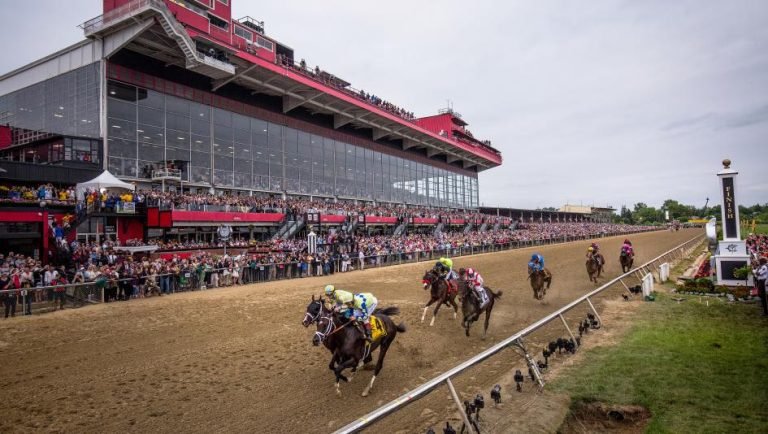Belmont Stakes
Belmont Stakes is one of the three races in the Triple Crown, which includes The Kentucky Derby and The Preakness Stakes. As a result, not only does this race have prestige within horse racing, it also has prestige with those who enjoy gambling. The Belmont Stakes is also different because it’s contested on a dirt track instead of a turf track. This race takes place every year at the end of May or early June at Belmont Park in New York City. Let’s take a look at how this prestigious race came to be!
The Belmont Stakes was first contested in 1867, and it was originally known as the “Belmont Derby.” The race was created to commemorate the opening of the Jerome Park Racetrack. The inaugural race was won by a horse named Ruthless, who was ridden by future Hall of Fame jockey James McLaughlin. McLaughlin went on to win the Belmont Stakes a total of five times. That year, the racetrack at Jerome Park closed and the Belmont Stakes was moved to the newly-opened Aqueduct Racetrack. The following year, the racetrack was moved again to another location within the same property. This time it switched locations from one side of the property to the other, and the race has been contested at that spot ever since.
The Belmont Stakes became a Grade 1 stakes race in 1924 and its distance was set at a mile and a half. In 2016, the New York Racing Association (NYRA) made a change to the Belmont Stakes and its distance was shortened by a furlong to its current distance of 1.5 miles.The Belmont Stakes is contested over a distance of 1.5 miles, which is about 2,000 meters. The race takes place on dirt, not on the traditional turf that many other races are contested on. There are three requirements for horses to be eligible for grading: they must race in at least three graded stakes races and their connections must apply. The New York Racing Association made a change to the Belmont Stakes in 2016 and shortened it from a mile and a half to 1.5 miles. In the 1990s, the race switched from racing at Belmont Park to racing at Aqueduct Racetrack because of spectator overflow.
In 1969, the race’s grade was upgraded from stakes status to Grade I by The American Graded Stakes Committee, which is now part of the Breeders’ Cup organization. The committee also stated that for a horse to be considered for grading, it needed to run in at least three graded stakes races and its connections had to apply.The 1970s brought about one notable change to the race: It switched from racing at Aqueduct Racetrack to racing at Belmont Park. This switch was made to accommodate the large number of spectators who were interested in watching the race.
The Belmont Stakes has been won by some of the most famous horses in history, including Secretariat (1973), Affirmed (1978), and American Pharoah (2015). The Belmont Stakes is the oldest of the Triple Crown races, and it has been contested more times than any of them.Taking the last six years into account, American Pharoah won the Belmont Stakes in 2015. The horse was ridden by Victor Espinoza and trained by the famous Bob Baffert. In 2016, a horse named Creator won by covering the length in 2:28 seconds. The horse was trained by Steve Asmussen and the jockey was Irad Ortiz Jr.
In 2017, the Belmont Stakes was won by Tapwrit, trained by the famous Todd Pletcher and the jockey was Jose Ortiz. In 2018, it was Bob Baffert again who won the prestigious event. This time he trained a horse named Justify, ridden by Mike Smith. They collectively covered the length in a fast track under 2:28 seconds.In 2019 trained by Mark E. Casse and the jockey was Joel Rosario. A year later, Tiz the Law won the event. The horse was trained by Barclay Tagg and the jockey was Manny Franco. The most recent Belmont Stakes took place in 2021, won by Essential Quality. The horse was trained by Brad H. Cox and the jockey was Luis Saez.

The record for biggest margin of victory goes to Secretariat by 31 lengths in 1973. The record for most wins by a jockey is with Jim McLaughin who won the Belmont Stakes consecutively 6 times( 1882, 1883, 1884, 1885, 1886, 1887). The record however is a joint one with Eddie Arcaro who won it for the first time in 1941. He then went on to win the prestigious event for the sixth time in 1955. The record for most wins in Belmont Stakes as a trainer goes to James G. Rowe Sr. He won the Belmont Stakes for the first time in 1883 and for the record eighth time in the year 1913.It is known as one of the most prestigious horse races in the United States, along with Triple Crown. The race has been contested since 1867 at different locations. Now it takes place at Belmont Park in Elmont and is held every year in early June.
The Belmont Stakes has a rich history that dates back to 1867 when it was first contested as the “Jersey Stakes” at Monmouth Park Racetrack. The race was moved to a different location on the property the following year and was renamed the “Monmouth Stakes.” The race was held at the track through 1908 when it moved to Morris Park Racecourse.The Belmont Stakes is part of the Triple Crown which is composed of three races: The Kentucky Derby, the Preakness Stakes, and then finally the Stakes. By winning all three of these races in a single year, a horse can be crowned as a Triple Crown champion.
The Belmont Stakes is unique because it’s the only one of the three Triple Crown races that are contested on a dirt track. The race takes place every year at the end of May or early June at Belmont Park in Elmont, New York.Customs of Belmont include the awarding of the Belmont Stakes trophy, a silver bowl that was designed by Tiffany and Company in 1878. The trophy is given to the winning owner, trainer, and jockey of the race.
Another tradition associated with the Belmont Stakes is that a band plays “The Stars and Stripes Forever” after the race is over. This song is played in honor of the United States military.The atmosphere at the Belmont Stakes is electric. If you are a fan of horse racing then it is a must-go event for you. Make sure you are there to watch the spectacle unfold. I hope this article helped you in gaining knowledge regarding the Belmont Stakes.




